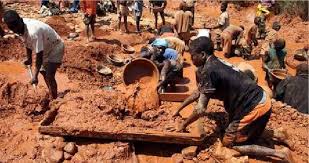Galamsey is the loose term used to describe the illegal scramble for gold in Ghana’s depleting forests which environmentalists say amounts fo environmental genocide.
The reason why Ghana was known as the Gold Coast in colonial times was no fluke given that such a resource literally bubbled on the ground surface invitingly enough for those who understand its benefit.
The price of precious metal has increased in recent years, prompting the mining of gold to intensify in a country still struggling with unemployment against the backdrop of torrid economic times for Ghanaians.
The rush for gold is mainly on thickly forested areas dotted around the country ranked sixth in the world for the export of this precious resource which has attracted tens of thousands of operators operating illegally.
The pressure on the land and vegetation has left environmentalists reeling as the effects leave their mark on the Ghanaian landscape, scaring rivers, lakes and even human settlements.
Ghana as a country is a famed cocoa producer and exporter which is second only to its neighbour Ivory Coast for the export of the produce. It had been the chief mainstay of her economy long before oil was discovered offshore.
Bodies of water like the River Pra have been polluted with thick yellowy residue finding its way from nearby mining sites to its river bed, threatening its fisheries resources.
Its water is no longer as ‘crystal clear” as it used to be decades ago when mining actitivities were at a minimum and not as intensive and sophisticated as nowadays with the Chinese looking to cash in on this mad rush for Ghanaian gold involved.
Galamsey has come a long way from the use of basic implements to carry out mining using spades and hands for digging. Today the advent of the Chinese meant more sophisticated equipment are used to more effectively extract gold from the ground. The result has been vast swathes of mining areas scared to a devastating effect for the environment.
Environmentalists accuse captains of this illegal industry which includes both local and foreign interests of greed and insensitivity to damages being done to the environment and other industries like farming and fishing.
Others say Ghana’s rivers are being poised by residues from the mercury used in mining gold.
Elemental mercury is used in the process of obtaining gold by amalgamating gold compounds which are heated and vaporised.
Campaigners claim that this approach has rendered the waters from the rivers and lakes unfit for drinking and other personal use by communities who have benefitted from them from time immemorial.
The damages are so visible that Ghanaians have been taking to the streets calling on the government to act and rein them in before more damage was done to their livelihoods which included fishing, and farming. These are sectors threatened by the pollution of rivers and lakes and intimidation of farm owners to abandon land earmarked by the powerful gold mining lobby for use.
Accusations are rife in the media including Ghanaian television talk shows that the government wasn’t acting decisively enough because some of its officials may be benefitting ‘handsomely’ from Galamsey.
In September the Ghana Forestry Commission began a spirited campaign against Galamsey on social media warning that the activity destroys land and soil fertility and leaves a devastating effect on forest wildlife and the ecology of the area. It has a huge banner on its website with an unmistakable message calling for an end to Galamsey.
Its rapid response team has been taking action on the ground, raiding a galamsey camp in the Subri Forest Reserve near Benso in the Western Region.
Four allegedly armed miners were arrested because they were mining in the prohibited Globally Significant Biodiversity Area of the forest, causing severe destruction to the vegetation and the landscape in the rush for gold.
The operation leader of the Rapid Response Team in Goaso, Mr. Abdul Karim Jakpa was wounded after his team was ambushed by illegal loggers deep in the forest. Although the incident has nothing to do with Galamsey, it is very instructive on the mammoth tasks to rein in illegal users of the forest who readily resort to violence to protect their livelihoods even if this is at the detriment of the environment.
The loggers had besieged a concession in the Obosomkese Forest Reserve in the Bechem Forest District.
The injured Karim Jakpa was operated upon to remove nine (9) pellets lodged inside his stomach.
“Of the 16 regions of Ghana, seven have been affected by illegal mining activities,” John Allotey who head the Ghana Forestry Commission told a news conference in August.
“34 out of 288 (forest) reserves have been affected,” he said adding that the estimated 4,726 hectares of destroye land is larger than Athens or Brussels.
With Ghanaians going to the polls in December, the Galamsey and what to do with it has walked its way to the electoral campaign of the two main contenders to replace current president Nana Akufo-Addo.


